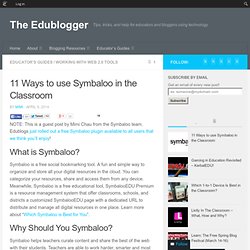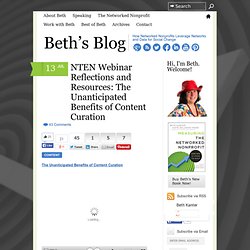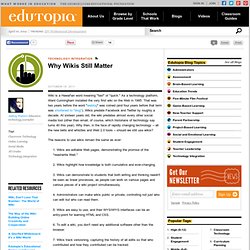

11 Ways to use Symbaloo in the Classroom. NOTE: This is a guest post by Mimi Chau from the Symbaloo team.

Edublogs just rolled out a free Symbaloo plugin available to all users that we think you’ll enjoy! What is Symbaloo? Symbaloo is a free social bookmarking tool. A fun and simple way to organize and store all your digital resources in the cloud. You can categorize your resources, share and access them from any device. Why Should You Symbaloo? Symbaloo helps teachers curate content and share the best of the web with their students. “Help, I’m drowning!” As schools start to implement 1:1 or BOYD methods in the classroom, teachers are required to keep up with the latest technology and teaching methods. And what about the “non tech-savvy” teachers that are struggling with technology? Symbaloo allows teachers to share valuable resources with their students and with each other. How do you Symbaloo in your classroom? 11 Ways to use Symbaloo in the Classroom 1. How do you share links with your students and parents?
2. Music Webmix: ETL523 Digital Citizenship Group Wiki. Edmodo. Scoop.it! Pearltrees tips. Blendspace. Benefits of content curation. Yesterday, I did a free NTEN Webinar called “The Unanticipated Benefits of Content Curation: Reducing Information Overload” based on my feature article in the NTEN Change Journal in June with the same title.

(You can register and download the issue here for free and listen to the webinar recording here) The main idea is that good curation skills can build staff expertise and avoid the pain of information overload. I covered the basics of content curation, how it differs from social sharing, the art and practice of curation, a frameworks to get started, examples of nonprofits using curation, the tools, and some techniques for minimizing information overload and managing attention. I pulled together a curated summary of the tweets and resources on Storify that you can view here. With over 600 people registered for the Webinar, it was hard to answer all the questions as the chat stream just flew by and the 90 minutes was up before we knew it.
A good curator also knows their audience. Pinterest. Why Wikis Still Matter. Wiki is a Hawai'ian word meaning "fast" or "quick.

" As a technology platform, Ward Cunningham installed the very first wiki on the Web in 1995. That was two years before the word "weblog" was coined (and four years before that term was shortened to "blog"). Wikis predate Facebook and Twitter by roughly a decade. At sixteen years old, the wiki predates almost every other social media tool (other than email, of course, which historians of technology say turns 40 this year). Why then, in the face of rapidly changing technology -- all the new bells and whistles and Web 2.0 tools -- should we still use wikis? The reasons to use wikis remain the same as ever: Fostering Student Collaboration With Google Docs.